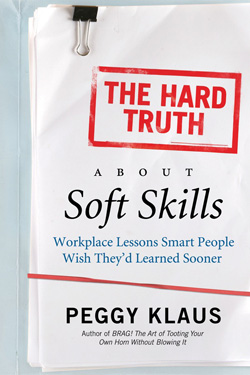54 lessons organized in 8 chapters, each of them covering an aspect where soft skills play an important role: career management, getting the job done, communication, handling critics, office politics, self-promotion, dealing with differences and leadership.
In her book “The hard truth about soft skills – workplace lessons smart people wish they’d learned sooner“, Peggy Klaus, tells us about the importance of soft skills on workplace, trying to understand why they are still so often ignored, although they are fundemental in our everyday work. The problem is semantic? What is soft cannot be considered serious? The matter is that most of us think that they are about touchy-feely people skills?
Among the 54 lessons pinted out by Klaus on the basis of her work experience:
 1. Knowing yourself is as important as knowing how to do your job
1. Knowing yourself is as important as knowing how to do your job
2. Learn when to stick and when to shift or the details will hang you
3. Know where to draw the line between self-improvement and self-destruction
4. When it comes to gossip, learn the art of deflection
5. Don’t take it personally
6. Your procrastination is trying to tell you something
7. Keep your visibility when you are not face-to-face








Recent Comments